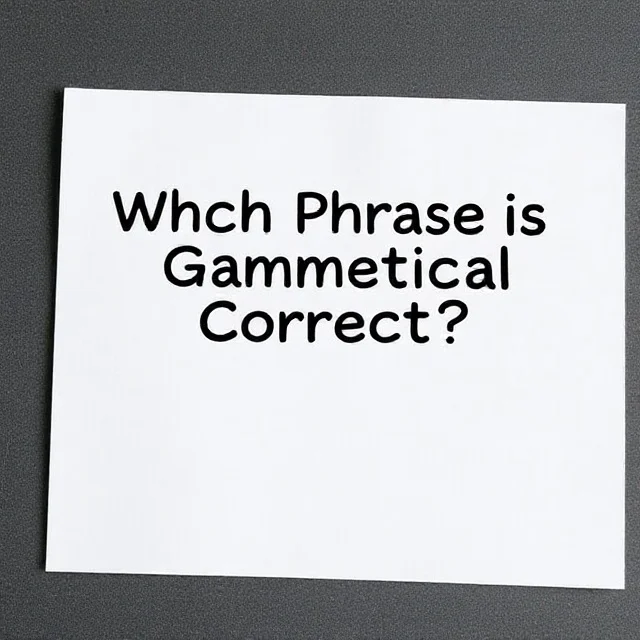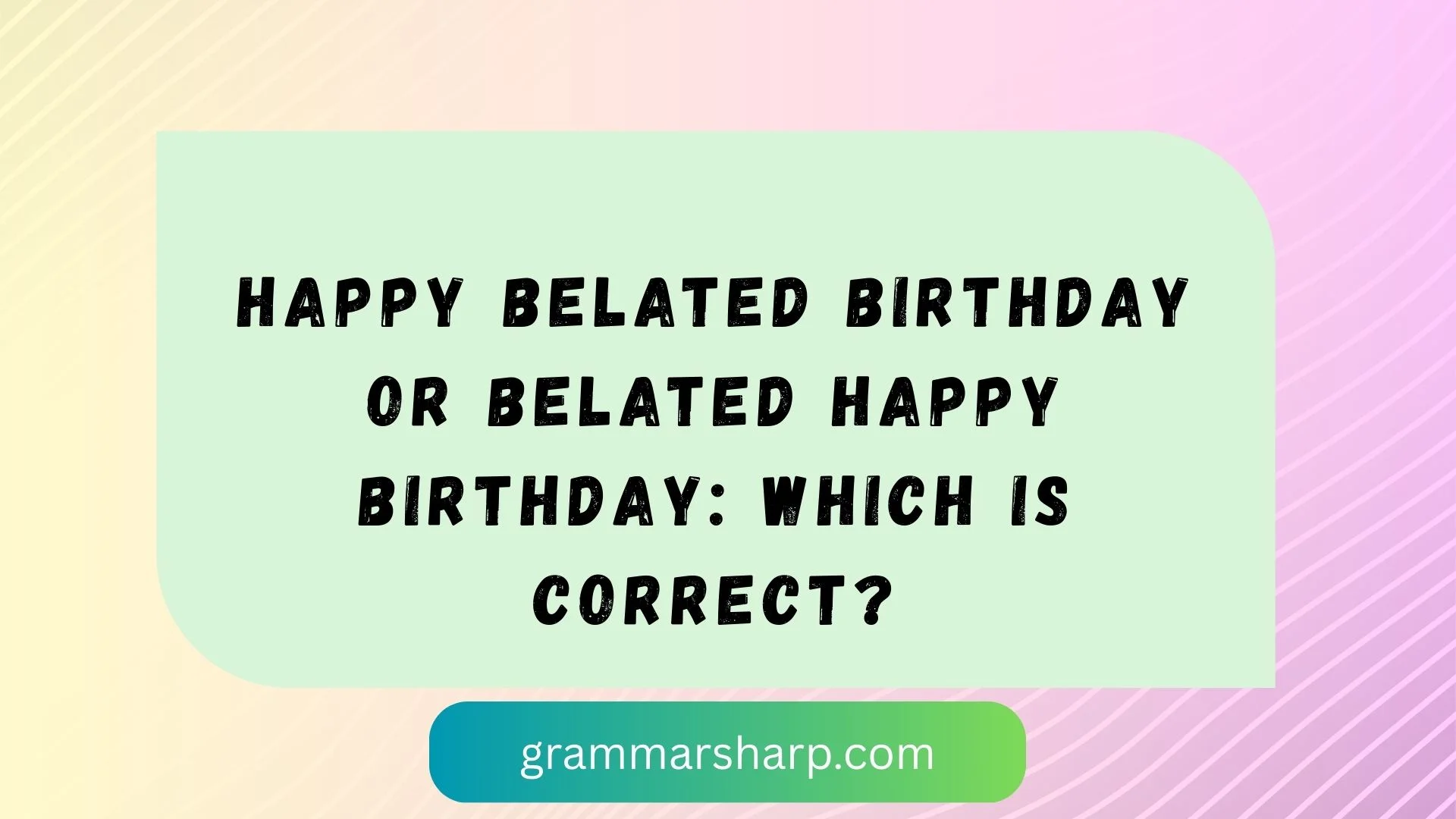We’ve all been there—you glance at your calendar, only to realize you missed your best friend’s birthday yesterday. Panic sets in as you reach for your phone. You type, “Happy Belated Birthday!” but then hesitate. Wait, is that even correct? Should it be “Belated Happy Birthday” instead?
This small debate has sparked endless confusion, especially for people who care about grammar but also want to sound natural and kind. After all, a birthday wish isn’t just about words—it’s about thoughtfulness. Still, nobody wants their message to look awkward or wrong.
The phrases “Happy Belated Birthday” and “Belated Happy Birthday” are used worldwide, but only one is technically correct according to grammar rules. Interestingly, the “wrong” one is often more popular in casual conversations and even in greeting cards. So which do you choose? Does it matter? And if you’ve forgotten a special day, how can you phrase your wishes in the most polite way?
This article dives deep into the grammar, meaning, etiquette, and real-life usage of both phrases. You’ll also get examples, alternative greetings, a helpful comparison table, and practical advice for handling belated birthday wishes gracefully. By the end, you’ll know exactly when to use “Belated Happy Birthday”, why “Happy Belated Birthday” isn’t technically correct but still common, and how to craft late wishes that still feel thoughtful.
Understanding the Meaning of “Belated”
Before settling the debate, let’s start with the word at the heart of the issue: belated.
- Definition: Belated means “coming or happening later than expected or desired.”
- Etymology: The word comes from Middle English “beleten,” meaning “to delay.”
- Usage: It’s almost always used to describe something late, such as a belated apology, a belated realization, or a belated gift.
Examples in everyday life:
- “She sent a belated thank-you note.”
- “His belated recognition of her hard work came after she resigned.”
- “They threw him a belated welcome party.”
Notice something important here: the word belated always modifies the event or action, not the adjective “happy.” You don’t say “happy belated,” because happy isn’t late—the birthday or the wishes are.
This linguistic detail is the foundation of the debate.
Which Phrase Is Grammatically Correct?

According to grammar purists and style guides, the correct phrase is “Belated Happy Birthday.”
Here’s why:
- Belated is an adjective that describes birthday, not happy.
- So the correct construction is “belated birthday,” just like you would say “belated apology” or “belated reply.”
- Therefore, the phrase should be “Belated Happy Birthday,” meaning “Happy [belated birthday].”
On the other hand, “Happy Belated Birthday” suggests that happy itself was delayed, which doesn’t really make sense. Your happiness wasn’t late; your wishes were.
Grammatical Example
- Correct: “Wishing you a belated happy birthday.”
- Incorrect: “Wishing you a happy belated birthday.”
Even Merriam-Webster and Oxford English Dictionary support this usage, noting that belated is properly attached to the noun (birthday), not the adjective (happy).
Common Usage vs Grammar Rules
Here’s where it gets interesting: while “Belated Happy Birthday” is grammatically correct, “Happy Belated Birthday” is far more common in everyday English.
- Many people say and write “Happy Belated Birthday” without a second thought.
- You’ll find it in greeting cards, text messages, and social media posts.
- Even native English speakers rarely stop to question it.
So, is “Happy Belated Birthday” wrong? Technically yes, but in casual communication, it has become socially acceptable. Language evolves, and common usage often wins over strict grammar rules.
Think of it like this:
- Ending a sentence with a preposition (“Who are you talking to?”) is frowned upon in old-school grammar, but in modern English, it’s normal.
- Likewise, “Happy Belated Birthday” may not be perfect grammar, but it’s widely understood and rarely criticized in informal contexts.
Polite Ways to Say a Late Birthday Greeting

If you want to avoid the grammar trap altogether, you can use alternative phrases that sound warm, thoughtful, and polite.
Here are some options:
- “Sorry I missed your birthday—wishing you joy and blessings!”
- “Sending you belated birthday wishes filled with love.”
- “I might be late, but my wishes are sincere. Happy Birthday!”
- “Better late than never—Happy Birthday!”
- “I hope your birthday was as amazing as you are.”
- “Apologies for the late wishes, but may the year ahead be wonderful.”
Pro Tip: In professional settings, avoid jokes about lateness. A simple, polite “Belated Happy Birthday” or “Wishing you a wonderful year ahead” works best.
Why Timing Matters in Birthday Greetings
Timing isn’t just about etiquette—it’s about showing that you care. Birthdays are special milestones, and forgetting them can sometimes hurt feelings.
- How late is too late? Generally, within a week is acceptable. Beyond that, it may feel insincere unless you acknowledge the delay.
- Cultural variations: In some cultures, belated wishes are completely fine as long as they’re heartfelt. In others, punctuality is seen as a sign of respect.
- Psychological impact: Studies in social psychology suggest that belated wishes can still strengthen relationships, because the act of remembering—though late—still shows thoughtfulness.
Think of it like receiving a late gift in the mail. It may not arrive on time, but it still warms your heart.
Examples in Different Contexts
Late birthday wishes can look different depending on who you’re addressing. Here are practical examples
Formal Settings (Workplace, Clients, Acquaintances)
- “Wishing you a belated happy birthday and a successful year ahead.”
- “I hope your special day was memorable. Please accept my belated birthday wishes.”
Informal Settings (Friends, Family)
- “Happy belated birthday, sis! You know I didn’t forget—I just like celebrating you longer!”
- “Sorry I’m late, but I hope your day was filled with love.”
Social Media Posts (Lighthearted, Casual)
- “Oops! Missed the big day, but happy belated birthday! 🎉”
- “Better late than never, right? Happy birthday, champ!”
Comparison Table: “Happy Belated Birthday” vs. “Belated Happy Birthday”
| Phrase | Correctness | Usage | Tone | Example Sentence |
| Happy Belated Birthday | Informally used | Very common in casual speech/cards | Casual, friendly | “Happy belated birthday, John!” |
| Belated Happy Birthday | Grammatically correct | Preferred in formal writing | Polite, professional | “Wishing you a belated happy birthday.” |
FAQs
Is “Happy Belated Birthday” wrong?
Technically yes, but it’s widely used and socially acceptable in casual settings.
Can I say “Belated Happy Birthday” in professional emails?
Yes. It’s the grammatically correct and polite option.
What’s the most polite way to wish someone late?
Use “Belated Happy Birthday” or a personalized message like “I hope you had a wonderful day. Sending belated best wishes!”
How late is too late to wish happy birthday?
Within a week is acceptable. After that, acknowledge the lateness directly with sincerity.
Which phrase do greeting card companies use?
Many greeting cards still use “Happy Belated Birthday,” showing how common the phrase has become.
Is there a cultural difference in belated wishes?
Yes. In some Asian cultures, it’s common to extend birthday celebrations for several days, so belated wishes are normal.
Conclusion
So, which is correct—Happy Belated Birthday or Belated Happy Birthday? The answer is simple: “Belated Happy Birthday” is grammatically correct because belated modifies birthday. However, “Happy Belated Birthday” has become so common that most people use it without thinking twice.
At the end of the day, what matters most isn’t perfect grammar but genuine thoughtfulness. Whether you’re a day late or a week late, the key is to show that you care. Words have power, but sincerity leaves the biggest impact.
So next time you miss someone’s birthday, don’t stress too much over grammar. Pick the phrase that feels natural for your relationship and situation. After all, it’s better to wish someone a late birthday than not at all.

